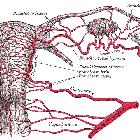uterine artery flow notching
Uterine artery flow notching refers to a phenomenon observed in uterine arterial Doppler ultrasound assessment.
Pathology
Associations
The presence of notching after 22 weeks is associated with several other conditions including adverse pregnancy outcomes. These include
- pregnancy induced hypertension (PIH)
- pre-eclampsia
- placental abruption
- intrauterine growth restriction (IUGR)
- increased maternal serum alpha fetoprotein (MSAFP)
Radiographic features
Doppler ultrasound
While notching can be either systolic or diastolic, it is typically seen as a trough-like notch between the systolic and diastolic phases.
Significance
The presence of notching in late pregnancy is an indicator of increased uterine vascular resistance and impaired uterine circulation .
Bilateral notching is more concerning. Unilateral notching of the uterine artery on the ipsilateral side of the placenta, if the placenta is along one lateral wall (right or left) carries the same significance as bilateral notching. The presence of an early diastolic notch can however be a normal finding in a non-pregnant uterus and even in a gravid uterus, at least up to 16 weeks, but notching typically begins to disappear in the gravid uterus by 13 weeks with clearly established diastolic flow by 20 weeks .
Siehe auch:

 Assoziationen und Differentialdiagnosen zu uterine artery flow notching:
Assoziationen und Differentialdiagnosen zu uterine artery flow notching:

